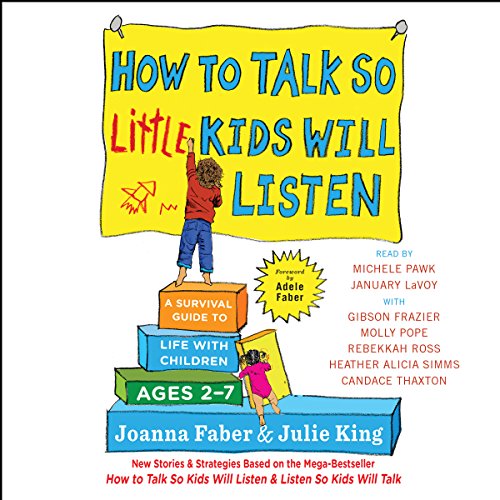By Joanna Faber and Julie King
I listened to this audio book before the start of my first practicum in order to have some tools for talking to kids. Although I’ve worked in schools for a few years, I don’t have kids of my own and I wanted to have more confidence and understanding when talking to little kids.
From the start of the first chapter, there was so much information and tips about talking to kids that I started taking point-form notes on each chapter. A lot of the tips boil down to clear communication with children, but the other theme that is returned to through out the book is validating feelings. When a kid is upset or frustrated, just like with an adult, it isn’t helpful to brush off their feelings.

While I may not have explicitly used some of the communication techniques covered in the book, there were definitely times that I validated kids’ feelings instead of brushing them off if they were sad or frustrated.
My full list of notes:
Chapter 1: Helping Children Deal with Their Feelings
- Validate feelings with words
- Instead of “but” use “The problem is…” or “Even though you know…”
- Use wish lists for delayed gratification
- Draw feelings
- Match the emotion; be dramatic
- Just listen
Chapter 2: Engaging Cooperation
- Make chores playful to increase cooperation
- Make inanimate objects talk
- Use silly voice and characters
- Play pretend or pretend incompetency “Is this how you do it?”
- Choices
- Put the child in charge
- Give information
- Say it with a word or gesture rather than a full statement
- Describe what you see, starting with the progress
- Describe how you feel
- Write a note or sign (such as “kitchen is closed”)
- Take action without insult (use “I”)
Chapter 3: Alternatives to Punishment
- Express your feelings
- Help the child make amends
- Problem solving with the child
- Come up with ideas together
- Try out the solution
- Plan ahead when possible
Chapter 4: Tools for Praise and Appreciation
- Describe what you see
- Describe the effect on others
- Describe the effort
- Describe the progress
- Consider asking questions or starting a converation instead of praise
- Don’t praise by comparison
Chapter 5: Tools for Kids that are Wired Differently
- Join them in their world
- Take time to imagine what they’re experiencing
- Put into words what they want to say
- Adjust expectations
- Adjust the environment
- Use alternates to speaking
- Tell them what they CAN do, instead of what they can’t
- Be playful
- Don’t expect new skills to be consistent
Chapter 5 1/4:
- If kids don’t feel right, they can’t act right
- Food, sleep, need for recovery time

Leave a Reply